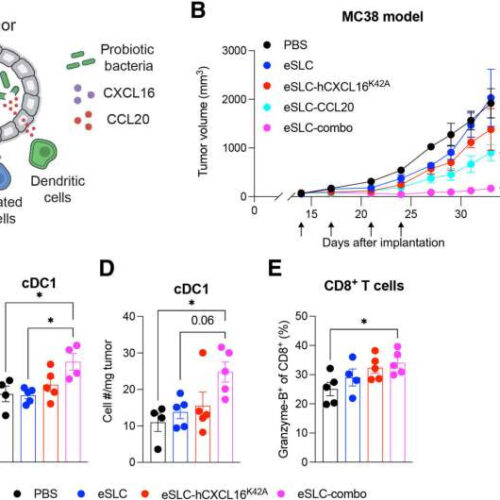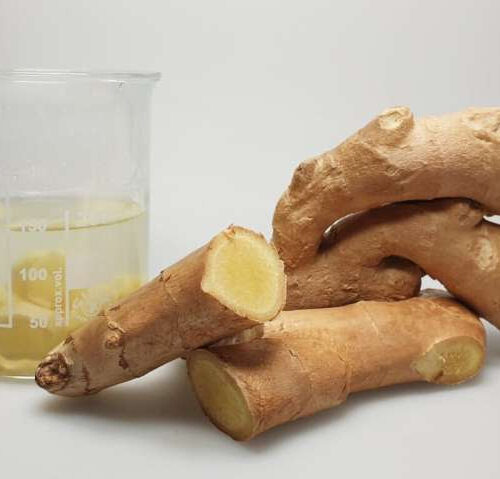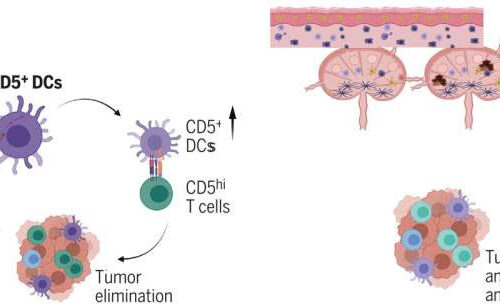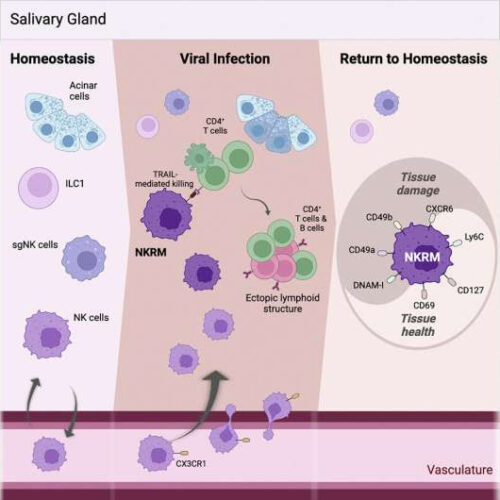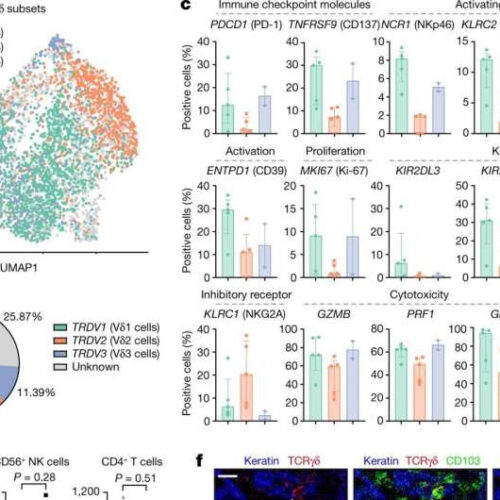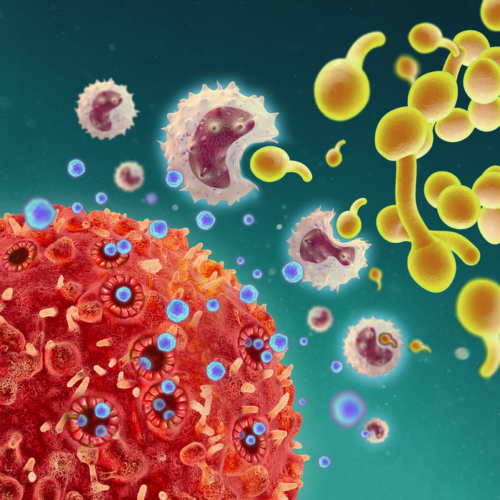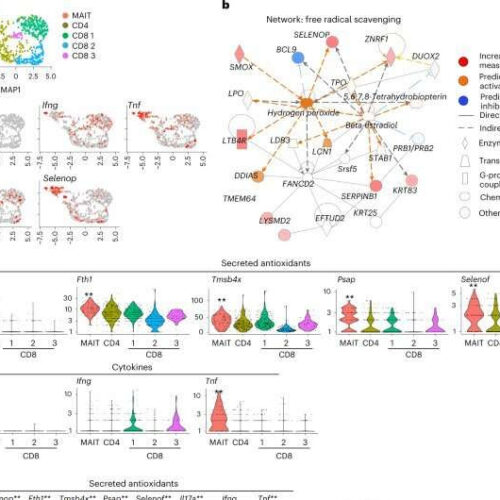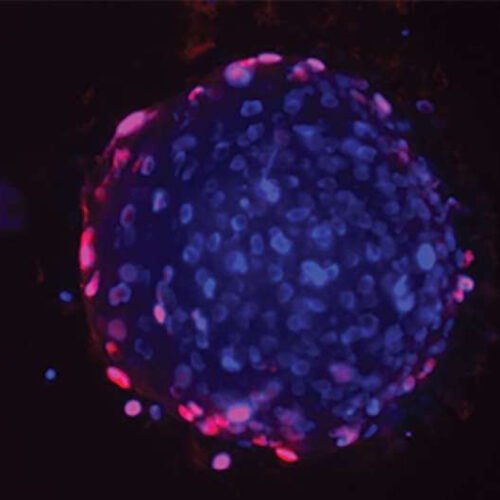by Krista Weidner, Pennsylvania State University Credit: Unsplash/CC0 Public Domain Vitamin D plays an integral role in regulating immune function, and Penn State researchers have identified immune cells in mice that can be differentiated by whether or not they have vitamin D receptors—a finding that could lead to a better understanding of the link between vitamin D...
Tag: <span>Immune cells</span>
Engineered bacteria find tumors, then alert immune cells
by Alan Dove, Columbia University Irving Medical Center Combination of CXCL16 and CCL20 synergizes to promote antitumor immunity. (A) Schematic overview of the approach to recruit DCs to tumors via CCL20 production in probiotic bacteria to complement activated T cell recruitment via CXCL16 (B) Tumor growth curves from C57BL/6 mice (n = 5 per group) subcutaneously implanted...
Pungent ginger compound puts immune cells on heightened alert
by Leibniz-Institut für Lebensmittel-Systembiologie an der TU München Whether as a medicinal plant or foodstuff, ginger is also becoming increasingly popular in Germany. Credit: Gisela Olias/Gaby Andersen/Leibniz-LSB@TUM Ginger has a reputation for stimulating the immune system. New results from the Leibniz Institute for Food Systems Biology at the Technical University of Munich (Leibniz-LSB@TUM) now support...
Cancer patients who don’t respond to immunotherapy may lack crucial immune cells
by Washington University School of Medicine CD5+ DC frequency was reduced in tumor-affected lymph nodes, and their presence correlated with greater patient survival in multiple tumors. CD5+ DC numbers increased during ICB therapy, and low IL-6 concentrations promoted their de novo differentiation. The requirement for CD5 on DCs was linked to the priming of effector CD5hiT cells and...
‘Natural killer’ immune cells can modify tissue inflammation: Study
by Monash University Graphical abstract. Credit: Immunity (2023). DOI: 10.1016/j.immuni.2023.01.016 Melbourne researchers have improved our understanding of how the immune system is regulated to prevent disease, identifying a previously unknown role of ‘natural killer’ (NK) immune cells. The Monash University-led study identified a new group of immune cells, known as tissue-resident memory natural killer (NKRM) cells. NKRM cells limited immune...
Specialized immune cells carry potential for new cancer immunotherapies
by Leiden University Tumor-infiltrating Vδ1 and Vδ3 T cell subsets display hallmarks of cytotoxic activity in MMR-d colon cancers. a, UMAP embedding showing the clustering of γδ T cells (n = 4,442) isolated from MMR-d colon cancers (n = 5) analyzed using scRNA-seq. The colors represent the TCR Vδ chain usage. Dots represent single cells. b, The frequencies of...
Study reveals previously unknown function of immune cells
LEIBNIZ INSTITUTE FOR NATURAL PRODUCT RESEARCH AND INFECTION BIOLOGY – HANS KNOELL INSTITUTE IMAGE: A CYTOKINE (BLUE) SECRETED BY T CELLS (RED) STIMULATES MONOCYTES (BACKGROUND) TO FEED ON C. ALBICANS HYPHAE (YELLOW). CREDIT: LUO YU/LEIBNIZ-HKI Certain T cells can secrete cytokines that are normally part of the innate immune system, as researchers from the Leibniz Institute for...
Dawn-to-dusk dry fasting leads to health benefits in the study of immune cells
by Baylor College of Medicine Credit: Unsplash/CC0 Public Domain Researchers at Baylor College of Medicine have found more evidence that dry fasting (fasting without food or liquid intake) from dawn to dusk can play an important role in overall health. In a new study published in Metabolism Open, researchers found that fasting from dawn to dusk for four...
Researchers discover how immune cells prevent cognitive decline
by Rutgers University MAIT cells express genes encoding secreted antioxidant molecules. Credit: Nature Immunology (2022). DOI: 10.1038/s41590-022-01349-1 Could the underproduction of poorly understood immune cells contribute to Alzheimer’s disease and other forms of cognitive decline? A Rutgers study in Nature Immunology suggests it may—and that increasing these cells could reverse the damage. Rutgers researchers deactivated the gene that produces...
Drug triggers immune cells to attack prostate cancer
by Julia Evangelou Strait, Washington University School of Medicine A drug compound stimulates immune cells to attack prostate tumors, according to new research from Washington University School of Medicine in St. Louis. Shown is a human prostate cancer organoid, a small 3D structure that serves as a model of prostate tumors. When the organoid is...


